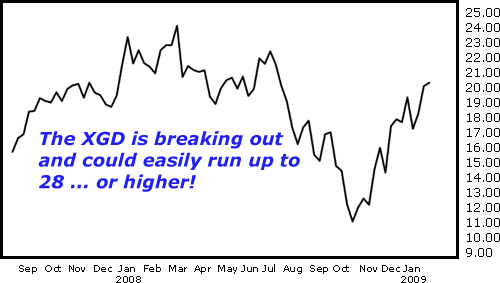Canada ETF Loads Up on Mining Companies
Post on: 29 Март, 2015 No Comment

The IndexIQ Canada Small Cap ETF (CNDA ). also a new fund, offers a contrast to the long-standing iShares MSCI Canada Index Fund (EWC ). As is the case with Australia, small cap isn’t better or worse than large cap. It’s a different exposure with pros and cons to consider.
The biggest difference is the industry makeup, specifically finance. Canada has few banks. The ones the country does have dominate the iShares fund with Royal Bank of Canada (RY ). Toronto-Dominion Bank (TD ) and Bank of Nova Scotia (BNS — Get Report ).
Canada is a resource-rich country. The materials sector has an 18% weighting in the iShares fund, compared with 50% for the Canada Small Cap ETF. The fund has 100 holdings, and the largest comprises 2.5% of assets.
The Canada Small Cap ETF provides plenty of exposure to smaller miners, such as uranium company Denison Mines (DNN — Get Report ). molybdenum giant Thompson Creek Metals Co. (TC — Get Report ) and interesting diversified firms like Inmet Mining, which mines copper, zinc and gold in places like Turkey, Finland and Panama. Those companies get little to no weighting in large-cap materials funds. During upswings, it’s the smaller companies that usually outperform.
The track record of the index underlying the Canada Small Cap ETF has been more volatile than any large-cap Canadian index. In 2005, small caps lagged the MSCI Canada Index by 16 percentage points, but in 2009, when large caps were up 57%, the small-cap index more than doubled. The volatility can easily be attributed to the 50% exposure to materials stocks, many of which mine more volatile commodities and have less stability in their businesses.
As is the case with the Australia ETF, the question isn’t which is better. In the U.S. the S&P 500 isn’t better or worse than the Russell 2000. They each capture different things and take turns outperforming and lagging. The standard deviation for the Canada Small Cap Index has been 37.1, which makes it more volatile than Canadian large caps and, for that matter, Australian small-cap stocks.
Anyone interested in the Canada Small Cap ETF needs to consider volatility and is advised to keep the weighting small. If there’s a slump in commodities, the ETF will decline more than broader or larger-cap investment products. By the same token, the ETF will outperform during rallies.
At the time of publication, BNS was a client holding.
Roger Nusbaum is a portfolio manager with Your Source Financial of Phoenix, and the author of Random Roger’s Big Picture Blog. Under no circumstances does the information in this column represent a recommendation to buy or sell stocks. Nusbaum appreciates your feedback; click here to send him an email.














